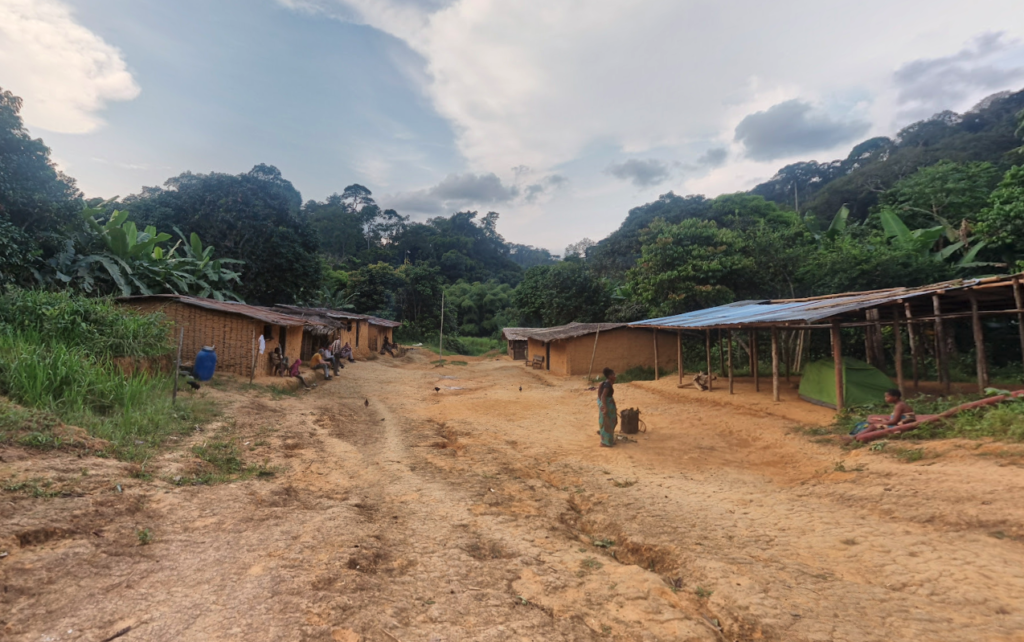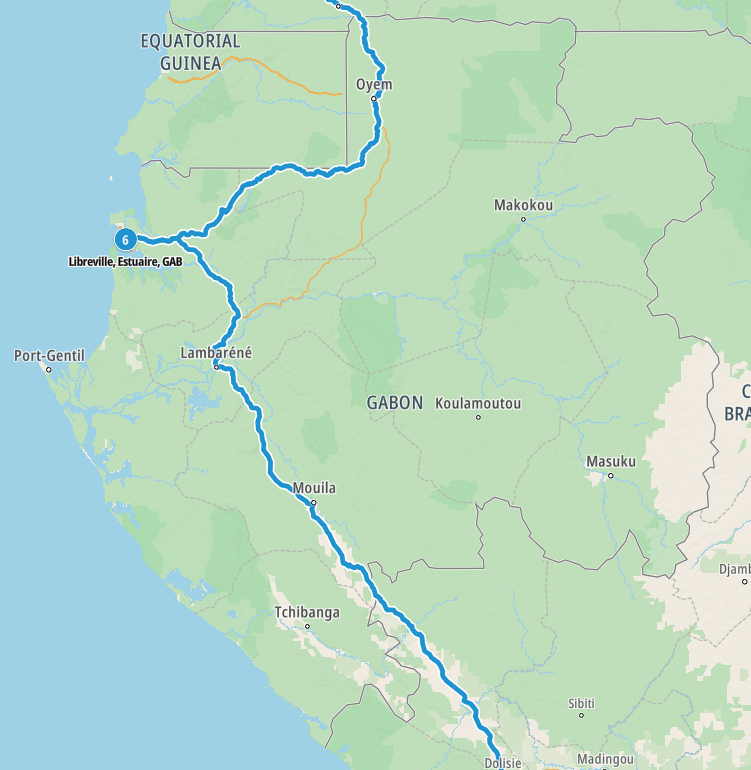Gabon / République gabonaise – Let’s explore here

What’s it like in Gabon?
Gabon is a comparatively rich country that sits on the boundary between central Africa and west Africa. It’s about the same size as the UK, and the terrain is comprised of savannah, mountains and plains by the coast. The highest point is Mont Bengoué, in the north east of Gabon, at 3,510 ft (1,070 m) above sea level. Ten percent of the country has been turned into natural parks.
The population of Gabon is almost 2½ million people (2023), about ¾ million of whom live in the capital, Libreville. The country shares land borders with Equatorial Guinea, Cameroon and the Republic of Congo, and it joined the Commonwealth in 2022. It relies heavily on its oil revenues.

A bit about the history of Gabon
Early History and Indigenous Groups
Gabon has a rich history that stretches back thousands of years. The indigenous peoples of Gabon include a variety of ethnic groups, such as the Fang, Punu and Myene. These groups have lived in the region for centuries, developing distinct cultures and societies. Gabon was known for its dense rainforests, which provided resources for the indigenous peoples, as well as its coastal areas, which facilitated trade and fishing.
European Exploration and Colonialism
In the late 15th century, Portuguese explorers were the first Europeans to arrive in Gabon. They initially sought to establish trade routes for slaves and other goods. Over the next few centuries, other European powers, including the French, also established a presence along the Gabonese coast. The French formally claimed Gabon as part of their colonial empire in the late 19th century, after defeating the local kingdoms. Gabon became part of French Equatorial Africa, a federation of French colonies in central Africa.
Colonial Rule and the Impact on Gabon
Under French rule, Gabon was subjected to economic exploitation and political control. The colonial government introduced cash crops such as cocoa and coffee, which were grown on plantations using forced labour. This system had a significant impact on the traditional ways of life for the indigenous peoples. The French also built infrastructure, including railways and ports, to support the colonial economy, but much of the wealth generated from these projects was directed towards France.
Path to Independence
After World War II, African independence movements gained momentum across the continent. In the 1950s, the French began to grant more autonomy to their African colonies. Gabon’s move towards independence was relatively peaceful compared to other African nations. In 1958, Gabon became an autonomous republic within the French Community. Finally, on 16 August 1960, Gabon gained full independence from France, with Léon M’ba becoming the country’s first president.
Post-Independence and the Rule of Léon M’ba
Following independence, Léon M’ba was initially seen as a unifying figure in Gabon. He worked to stabilise the country and secure its independence from French influence. However, M’ba’s presidency was marked by tensions between different political factions, particularly between the more traditionalist and modernising elements of Gabonese society. In 1964, a failed coup attempt against M’ba was backed by a small faction of the military. After the coup’s failure, M’ba’s government was solidified, and he continued to lead Gabon until his death in 1967.
The Presidency of Omar Bongo
After Léon M’ba’s death, Omar Bongo, the country’s prime minister at the time, took over as president. Bongo’s rule, which lasted from 1967 to his death in 2009, was one of the longest in African history. During his presidency, Gabon maintained a relatively stable political environment, but the country remained a one party state for much of his rule. Bongo established a strong patronage system, relying on oil revenues to maintain political support. Under Bongo’s leadership, Gabon became one of the wealthiest countries in sub-Saharan Africa due to its substantial oil reserves.
Oil and Economic Growth
Oil was discovered in Gabon in the 1970s, and it became the backbone of the country’s economy. The wealth generated from oil exports enabled the government to invest in infrastructure projects and public services. However, the dependence on oil led to a lack of diversification in the economy, making Gabon vulnerable to fluctuations in global oil prices. While the country became relatively prosperous, the wealth was not equally distributed, and poverty remained a significant issue for many Gabonese people.
Transition After Omar Bongo
Following Omar Bongo’s death in 2009, his son, Ali Bongo Ondimba, succeeded him as president, continuing the family’s long rule over Gabon. Ali Bongo’s presidency has been marked by efforts to modernise the country’s infrastructure and diversify the economy, particularly by promoting sectors like tourism and sustainable forestry. However, his government has faced criticism for continuing the authoritarian political practices established by his father, including the suppression of opposition and restrictions on political freedoms.
Political Unrest and Challenges
In 2016, Ali Bongo won re-election in a highly controversial and contested vote. The opposition alleged widespread electoral fraud, and protests broke out across the country. The government responded with force, and the political situation remained tense for several years.
In August 2023, following further disputed elections in which President Ali Bongo Ondimba was declared the winner, the military staged a coup and overthrew the long-standing Bongo regime. The coup ended more than five decades of Bongo family rule in Gabon. Military officers dissolved key state institutions, including the judiciary, parliament, and the constitutional assembly. General Brice Oligui Nguema, who led the coup, was appointed as the interim president in September 2023.
In 2024, a referendum was held on a proposed new constitution that aimed to limit presidential terms to two seven-year periods and remove the position of prime minister. As of 2025, Gabon remains in a period of political transition following the coup. The government is focused on implementing constitutional reforms, addressing economic challenges, and ensuring greater political inclusivity.

Gabon road trip
Our Gabonese road trip is part of a much larger African road trip.
Map of Gabon

Our current planned Gabonese road trip takes from Equatorial Guinea via the capital, Libreville, before heading on to Congo Brazzaville.
No doubt we’ll explore the country much more than this continent-spanning short route shows, in particular checking out eastern Gabon.
Hopefully our journey will improve our knowledge of this intriguing and beautiful country, and enable us to meet some interesting people. We’ll be updating this page at that time – don’t forget to check back 🙂
What’s it like to drive in Gabon?
They drive on the right hand side of the road in Gabon. In the main, roads are better than average, although many are unsurfaced dirt tracks. Driving standards are poor however.
Do you require an international driving permit in Gabon?
We’ve created a dedicated page to driving abroad, which answers this question, and more, which you might find helpful.
Can you use your UK driving license when driving through Gabon?
We’ve created a dedicated page to driving abroad, which answers this question, and more, which you might find helpful.
Do I need a carnet de passages to drive in Gabon?
We’ve created a dedicated page to driving abroad, which answers this question, and more, which you might find helpful.
What currency do they use in Gabon?
In Gabon they use the Central African CFA franc. Cash is widely used. The use of credit / debit cards is not widely accepted outside of the capital. Traveller’s cheques are not readily accepted. There are few ATMs in cities and towns throughout the country.
The Central African CFA franc is used in Cameroon, Central African Republic, Chad, Republic of Congo, Equatorial Guinea and Gabon.
You should make yourself aware of the amount that your bank charges you for using credit and debit cards abroad. Often credit cards are cheaper for purchasing items directly, and for withdrawing cash from ATMs.
What language do they speak in Gabon?
They speak French in Gabon, although Fang is also widely spoken. English is becoming more widely spoken, in particular among the younger generations.
What time zone is Gabon in?
Remember, when you’re planning your next trip to take a look at what time zone it’s in.
Do I need a visa to visit Gabon?
We’ve created a dedicated, more comprehensive page on visas, which you should find helpful. Check it out!
Is wild camping legal in Gabon?
Yes, wild camping is fine in Gabon.
What plug / socket type do they use in Gabon?

In Gabon they use plug / socket type C.
Health issues in Gabon
Is it safe to drink water in Gabon?
No, it is not safe to drink tap water in Gabon. Bottled water is readily available throughout the country.
What vaccinations are required for Gabon?
This NHS website is kept up to date with all relevant information on vaccinations in Gabon.
Phones in Gabon
What is the country calling code for Gabon?
The country calling code for Gabon is +241
What are the emergency phone numbers in Gabon?
- The emergency number for police in Gabon is: 1730
- In Gabon, the emergency number for ambulance is: 1300
- The emergency number for fire in Gabon is: 18
If you’ve got some useful info that you’d like to share, let us know!
And don’t forget to check out all the other pictures!
